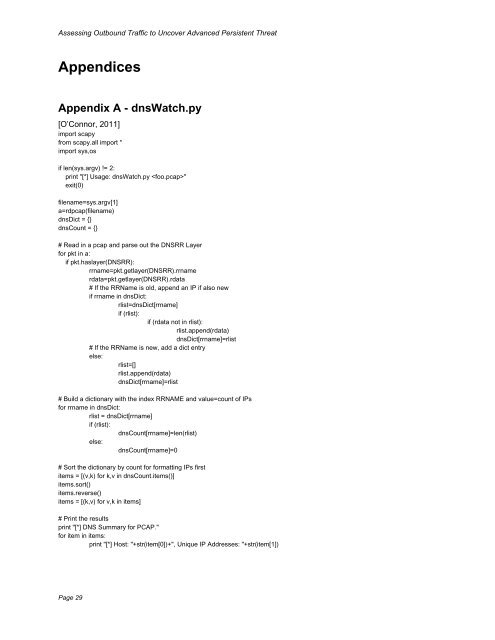JWP-Binde-McRee-OConnor
JWP-Binde-McRee-OConnor
JWP-Binde-McRee-OConnor
You also want an ePaper? Increase the reach of your titles
YUMPU automatically turns print PDFs into web optimized ePapers that Google loves.
Assessing Outbound Traffic to Uncover Advanced Persistent Threat<br />
Appendices<br />
Appendix A - dnsWatch.py<br />
[O’Connor, 2011]<br />
import scapy<br />
from scapy.all import *<br />
import sys,os<br />
if len(sys.argv) != 2:<br />
print "[*] Usage: dnsWatch.py "<br />
exit(0)<br />
filename=sys.argv[1]<br />
a=rdpcap(filename)<br />
dnsDict = {}<br />
dnsCount = {}<br />
# Read in a pcap and parse out the DNSRR Layer<br />
for pkt in a:<br />
if pkt.haslayer(DNSRR):<br />
rrname=pkt.getlayer(DNSRR).rrname<br />
rdata=pkt.getlayer(DNSRR).rdata<br />
# If the RRName is old, append an IP if also new<br />
if rrname in dnsDict:<br />
rlist=dnsDict[rrname]<br />
if (rlist):<br />
if (rdata not in rlist):<br />
rlist.append(rdata)<br />
dnsDict[rrname]=rlist<br />
# If the RRName is new, add a dict entry<br />
else:<br />
rlist=[]<br />
rlist.append(rdata)<br />
dnsDict[rrname]=rlist<br />
# Build a dictionary with the index RRNAME and value=count of IPs<br />
for rrname in dnsDict:<br />
rlist = dnsDict[rrname]<br />
if (rlist):<br />
dnsCount[rrname]=len(rlist)<br />
else:<br />
dnsCount[rrname]=0<br />
# Sort the dictionary by count for formatting IPs first<br />
items = [(v,k) for k,v in dnsCount.items()]<br />
items.sort()<br />
items.reverse()<br />
items = [(k,v) for v,k in items]<br />
# Print the results<br />
print "[*] DNS Summary for PCAP."<br />
for item in items:<br />
print "[*] Host: "+str(item[0])+", Unique IP Addresses: "+str(item[1])<br />
Page 29










